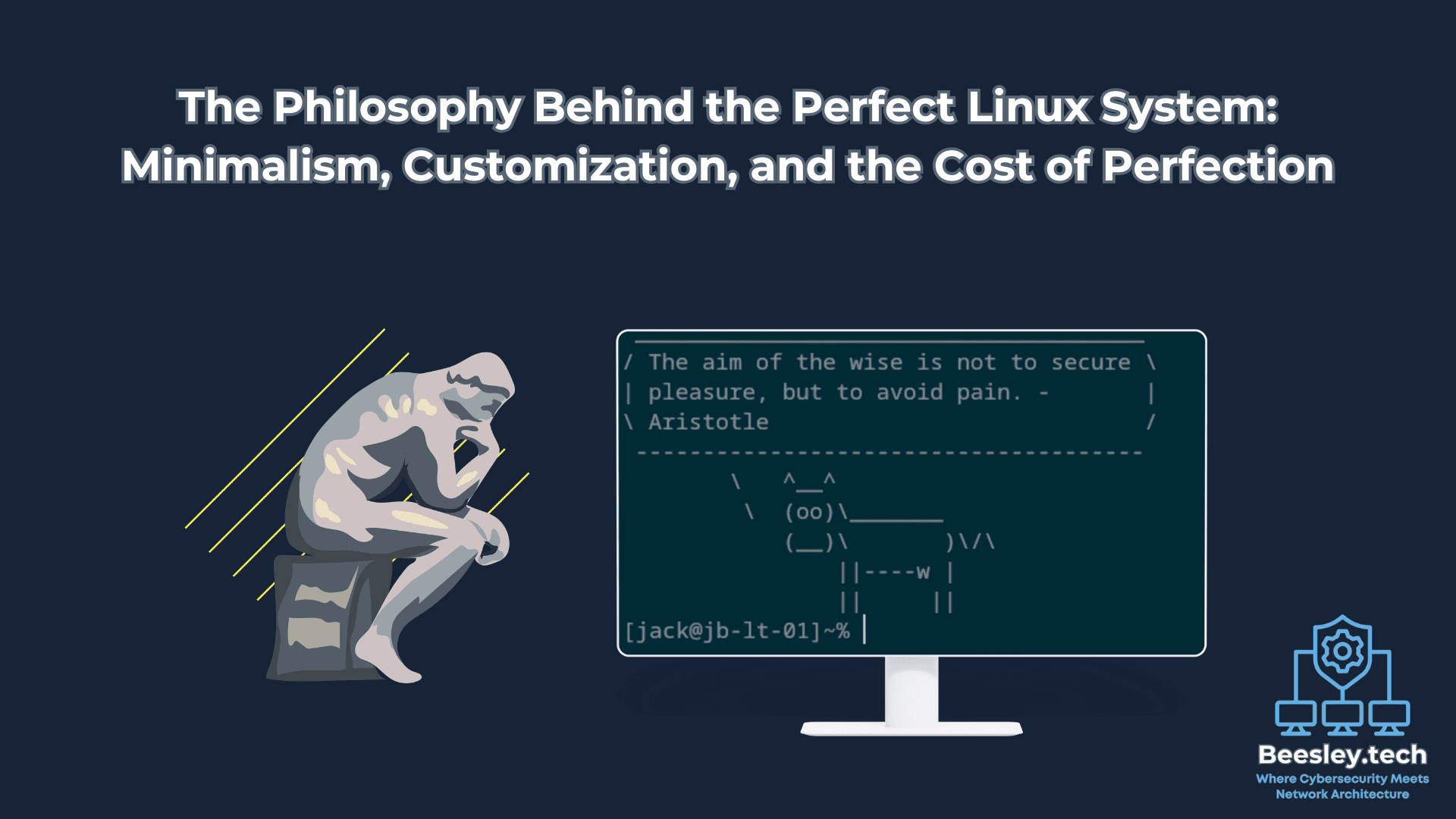As I continue my journey toward creating the perfect Linux system, I’ve been reflecting on the core philosophies that drive this pursuit. At its heart, it’s about finding the right balance between minimalism, customization, and the effort required to achieve perfection. These principles not only shape how I build my system but also inform the values that make Linux such a powerful platform.
Minimalism: Less Is More
There’s a famous quote by Antoine de Saint-Exupéry that has become a guiding principle in my life:
“Perfection is attained not when there is nothing more to add, but when there is nothing left to take away.”
This idea resonates deeply when it comes to building a Linux system. Minimalism isn’t about stripping everything away for the sake of it; it’s about removing bloat and distractions so that only the essential remains. A lightweight system:
- Increases efficiency by reducing resource usage.
- Improves performance by eliminating unnecessary processes.
- Simplifies troubleshooting because there’s less complexity to manage.
Why Minimalism Matters in Computing
When a system is cluttered with features you don’t use, it becomes harder to focus on what you actually need. I’ve often found that less is more—a lean, modular system gives me the freedom to work without distractions, and everything feels faster and more purposeful.
This mindset is why I’ve moved away from distros like Ubuntu, which felt overly bloated with unnecessary services, and toward systems like Fedora, which strike a better balance between functionality and simplicity.
Customization: Empowering the User
One of Linux’s greatest strengths is its ability to let you make the system your own. Unlike other operating systems, Linux gives you full control over your environment. From the desktop environment to the terminal emulator, everything is customizable to fit your workflow and preferences.
Why Customization Is Powerful
Customizing your system isn’t just about aesthetics—it’s about optimizing your workflow. By tailoring my system to my needs, I can:
- Save time by setting up shortcuts and tools that I use frequently.
- Streamline workflows by removing unnecessary steps.
- Gain confidence in knowing my system inside and out.
When I configure a window manager or write a shell script to automate a task, I’m not just creating something functional—I’m building a system that feels uniquely mine. It’s this level of personal empowerment that makes Linux stand out.
But with great power comes responsibility. Customization requires effort, and it can be easy to fall into the trap of spending more time tweaking than actually using your system. This leads to the next point: Is the pursuit of perfection worth it?
The Cost of Perfection
Building the perfect Linux system is a labor of love, but it’s not without its challenges. It takes time, energy, and a lot of trial and error to get things just right. So, the question arises: Is the effort worth it?
The Challenges
- Time-Consuming: Configuring a system from scratch, testing software, and troubleshooting can take hours or even days.
- Frustration: Sometimes, things break or don’t work as expected, leading to wasted time.
- Never-Ending: The quest for perfection can feel like chasing a moving target—there’s always something new to try or improve.
Why I Think It’s Worth It
Despite the challenges, I believe the effort pays off in the long run. Here’s why:
- A System Built for You: When you’ve put in the effort to customize your system, it works exactly how you want it to. Every shortcut, configuration, and tool is there because you need it.
- Learning and Growth: The process of tweaking and experimenting teaches you a lot about Linux, your tools, and even yourself. You gain a deeper understanding of how your system works, which makes you more self-reliant.
- Satisfaction: There’s something incredibly rewarding about creating a system that feels perfectly tailored to your needs.
Conclusion: Finding Balance
Minimalism, customization, and the pursuit of perfection aren’t mutually exclusive—they’re all part of the journey toward creating a system that feels just right. For me, it’s about striking a balance: removing the unnecessary, tailoring the essential, and investing my time wisely.
Does striving for perfection take effort? Absolutely. But when the result is a system that’s faster, simpler, and uniquely yours, I’d argue it’s worth every second.
Don’t forget, I will also be offering free Linux system administration assistance to help people with setup, troubleshooting, and optimization. Additionally, I will soon be live streaming Linux window manager labs, so if you’re interested in learning, experimenting, or just hanging out and discussing Linux, stay tuned!
What are your thoughts? Do you lean toward minimalism, heavy customization, or something else entirely? Let me know—I’d love to hear how you approach building your ideal Linux system!
👉 Check out my store for my services and resources: https://stan.store/jackbeesley

